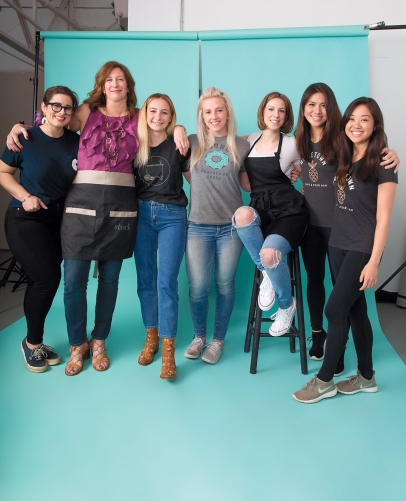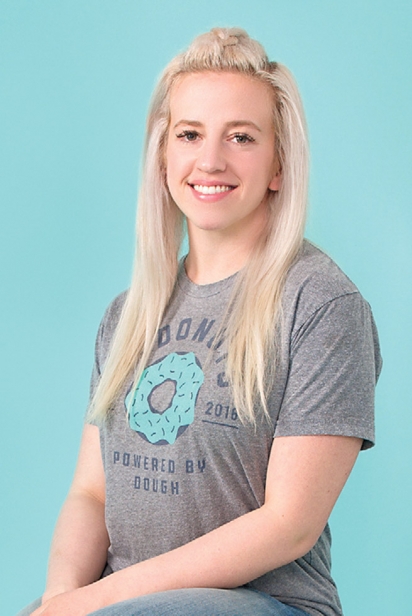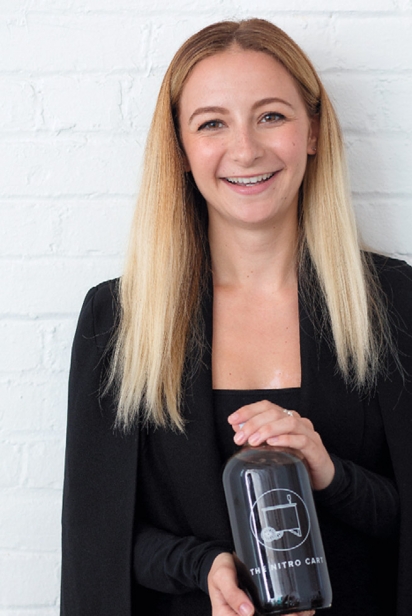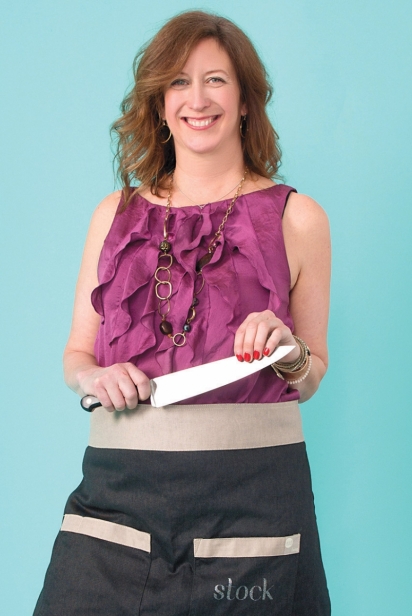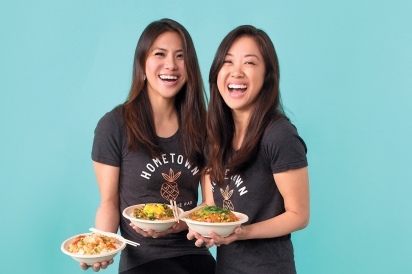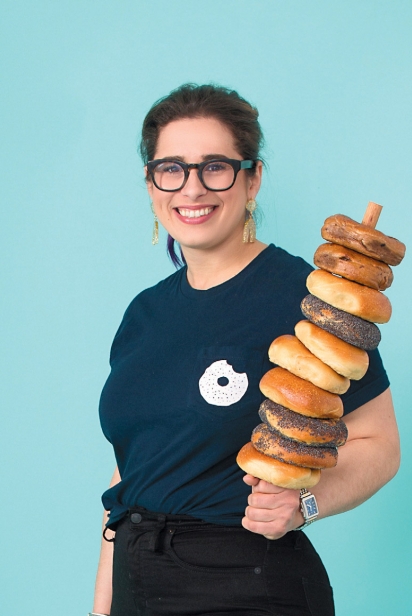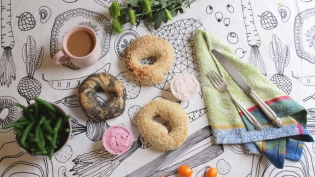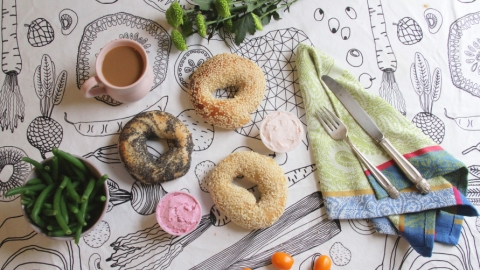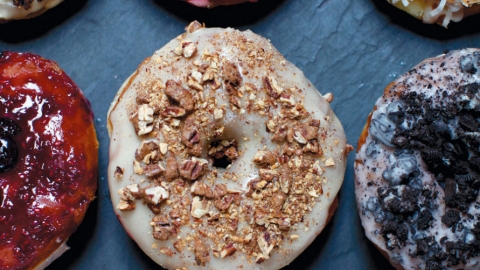Owning It
How a Group of Female Food Entrepreneurs Is Putting a Decidedly Modern Spin on What It Means to Own a Business
Ask Milena Pagan, owner of Rebelle Artisan Bagels in Providence, what it’s like to own a business, and she might share an analogy.
“I tell people it’s like the ballet: You go to the ballet and it looks graceful and effortless, but when you think about the rehearsals and the toll it takes on your body, that’s where the real work is. So if you want to start a business, you have to think about all of that, not just the show.”
It’s an apt description, encompassing the duality that is an entrepreneurial vocation.
But unlike ballet, all tulle and perfectly polished choreography, Pagan is not afraid to lift the curtain on what goes on on both sides of her baking stage.
And, she’s not alone.
She’s in the company of six other local female entrepreneurs who, in their journeys to business ownership, have formed a sort of sisterhood, a girl squad, bonded by the trials and tribulations they’ve faced in getting their ventures off the ground, and opening up to anyone who wants to hear about it, in a series of ticketed forums called, aptly, Bitchin’.
Gathering regularly at Rebelle in front of a mostly female crowd, this bitchin’ squad— made up of Pagan; Audrey Finocchiaro of The Nitro Cart; Victoria Young of Vic’s Craft Ice Cream; Rebecca Brady and Tiffany Ting of Hometown Poké; Jan Dane of Stock Culinary Goods; and Lori Kettelle of PVDonuts—readily share their experiences on everything from financing obstacles to what it’s like to go into business as a woman and the sexism they’ve occasionally faced in the process.
Instead of the traditional business-plan / loan / brick-and-mortar path, they’re putting a decidedly modern spin on entrepreneurship, building brands by harnessing the power of pop-ups and social media and, in many cases, self-funding to get off the ground. They emerged on the local food scene within a few years of one another, each finding their own niche in the market, which they’ve filled with unique products that stand out for both their quality and ingenuity. They’ve each carved their own path, some scaling up at lightning speed while others grew at a slower pace. All have graduated from pop-ups to storefronts of their own.
Still, if there’s one notable commonality among them, it’s that they’re doing it all with a fearlessness that’s nothing short of inspiring.
“I’m so grateful to have fallen into this young group,” says Dane, the only one who has been brick-and-mortar from the beginning. “It’s amazing how uncompromising they are and how courageous they are. These ladies just came tearing in and I feel like I’m very much the beneficiary of their courage.”
The rest of the women insist that they have benefitted from their relationship with Dane, who hosted all of them for pop-ups in her store when they were nurturing fledgling businesses.
“When other people weren’t taking us seriously, Jan did and gave us a place where we could actually test our food and market,” Brady says.
It was through Dane that many of them met, going on to form friendships and a network of women with whom they could both celebrate and commiserate.
That type of support is critical in navigating a world where fickle customers, long hours and financial sacrifice are the norm, and work-life balance doesn’t exist. The women are quick to stress in the Bitchin’ forums— and to anyone who asks—that what people see on Instagram only shows a small, well-filtered slice of reality.
“A lot of people go into business thinking it’s going to be so fun. Social media makes it look like you’re killing it all the time, and it’s not like that. It takes years to get to a place where it can look like that,” Finocchiaro explains.
The full picture includes challenges that each woman has had to overcome.
Kettelle, along with her co-owner-husband, Paul, has created such a hunger for her donuts that she has a line out the door of her Fox Point shop almost daily. But it wasn’t always like that. Back when they were first starting out, selling a few dozen donuts at a time through farmers markets and wholesale orders, and unable to get a loan, they were maxing out credit cards to buy equipment and ingredients.
“We never thought about the money we were making. We always just saved all of it so we were ready for the next step,” Kettelle recalls. The next step came quickly; within months of launching the couple was able to start planning the move to their shop.
For others, initial struggles were less about money than demand.
Finocchiaro recalls the first summer that she and co-owner Sam Lancaster took their coffee cart out. Every day they would pop up somewhere in the city, but they were barely attracting any customers, sometimes going home with only $60 a day. They were about to give up when, one day at the end of the summer, Lancaster decided to take the cart over to Brown to see if the returning students had a thirst for their super-smooth cold brew. Later in the day, he called Finocchiaro to say he’d completely sold out.
“We realized Brown was our market, people our age, and then the business started to turn around,” Finocchiaro says.
Not everyone had such an “aha!” moment that signaled that they were onto something; some approached their business with blind confidence, while for others, growth was more gradual.
Before they could even test their product, Ting and Brady purchased a trailer off of Craigslist in Connecticut, so that they could start selling the poké bowls they’d created from fresh ingredients inspired by time living in California and travels to Hawaii.
“Everyone thought we were insane,” says Brady. “But we haven’t really heard from too many people who didn’t like our product.”
Young took a more cautious tack, tapping into her culinary training from Johnson & Wales to develop recipes at incubator kitchen Pilotworks (now the Providence Kitchen Collaborative) and testing them at pop-ups at Stock to hone in on preferred flavors, toppings and textures. Among the group, she was the last to make the move to brick-and-mortar, just opening her shop, called Vic’s Craft Ice Cream, in Barrington, this May. The decision to hold out isn’t one that she regrets.
“I had earlier conversations with investors who could have put me in a storefront but they just didn’t feel right,” Young says. “It’s really important to be up front and to be able to figure out what they want out of it.”
In starting her business, Pagan recalls the initial criticism she received for choosing the East Side location of her current shop, which had former iterations as a convenience store and liquor store but was friendlier to her budget than other spots.
“People were telling me ‘Nothing works there, that’s not where your market is.’ But I wanted to do it myself and if it meant we started scrappy, then we started scrappy.”
Pagan embraced that scrappy mentality when it came to product development, too, perfecting her bagels and other baked goods by way of YouTube, rather than formal training, and testing them out on colleagues at her former 9-to-5.
But even those who saw a speedier trajectory encountered a learning curve or two.
“We did a whole month of fruit flavors and it was the slowest month we’ve ever had,” Kettelle says of her donuts. “Now we know our customers, know what works and also know that we have to slowly educate them on ingredients.”
Kettelle admits she’s still learning, sometimes doubting flavors that end up working well, like a chocolate tahini on one recent menu and a special Flamin’ Hot Cheetos that also drew a crowd.
“I’m slowly starting to be more open to ideas,” she says.
Dane, too, had to learn over time what customers were looking for, adding to the mid-century-modern-style inventory and locally made wares she brought in initially to incorporate more styles of cookware, crowd-pleasing cookbooks and kitchen gadgets.
Scaling for commercial sales also presents challenges, according to Finocchiaro, who opened a coffee bar inside Dash Bicycle on the West Side after about a year of doing pop-ups.
“It’s a big transition going from a Mason jar to 50-gallon vats to stainless steel vats,” she says.
She and Lancaster learned that lesson the hard way, early on, at their very first pop-up, at a sheep-shearing event in Jamestown— “the only place that would let us pop up,” Finocchiaro recalls.
The two, unbeknownst to them, had brought a batch of cold brew that was a triple concentrated version of their original recipe.
“Parents were literally coming up to us, shaking [from the caffeine], saying, ‘This is amazing!’” she says with a laugh.
Though their highs and lows have all been different, all of the women can agree that sexism has shaped their experiences in some way.
“I can’t tell you how many times people ask me if my dad is paying for the business, or assume that my husband is a co-owner,” says Pagan.
“As a female, there are times when people don’t take me as seriously when I’m trying to get things done,” Young says. “It’s harder than it should be.”
Still, they don’t deny that their gender can be an advantage sometimes, too.
On the second day out with their pop-up trailer near Brown University, Ting and Brady’s generator broke and a group of construction workers offered to loan them one.
“If we were guys, I’m not so sure they would have been so quick to just give us a generator,” Ting says.
Being female has another advantage, too: friendship.
The seven women regularly text and hang out to talk about everything from a certain day’s sales to advice on vendors or just to be a shoulder to lean on.
“We all became friends very organically,” Pagan says. “Having that emotional support is really important. I wonder if the boys club is there to hear each other out like that.”
Whether or not they are, the dance being done by this group of women continues— they’ve got the choreography down and they’re ready to take on whatever aches and pains they earn behind the scenes.
“This has to be something you truly love, because you’re working morning to night,” Dane says. “But I wouldn’t trade it for the world.”


